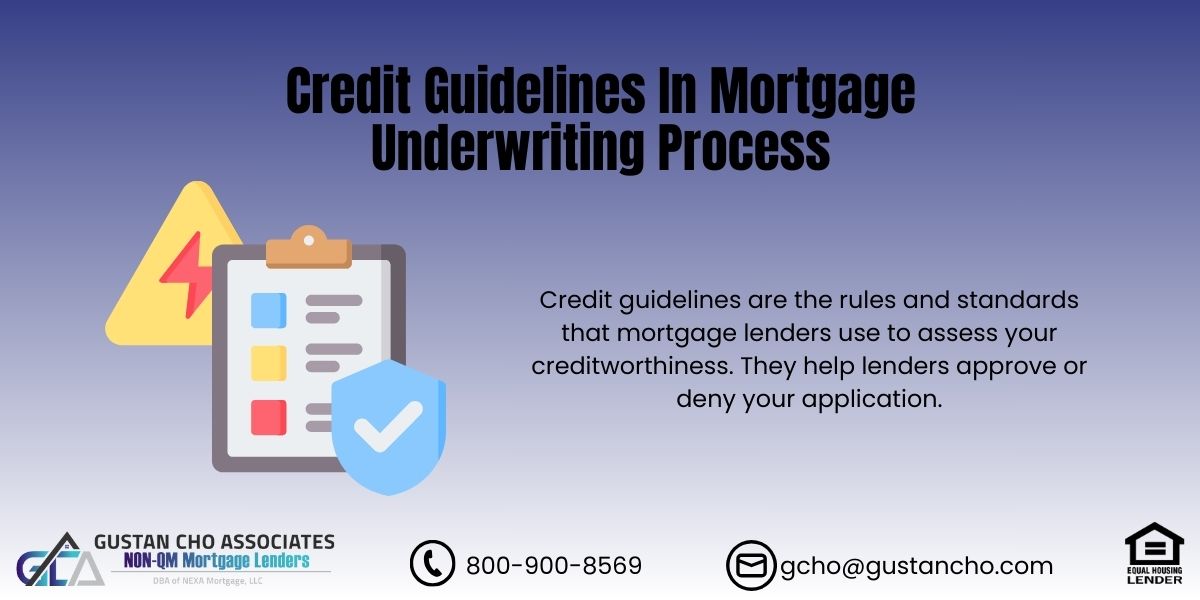Credit Guidelines In Mortgage Underwriting Process
Credit Guidelines in Mortgage Underwriting Process: Your 2024 Guide to Mortgage Approval
Purchasing or refinancing a home is one of the biggest financial steps you’ll take. Whether you’re a first-time homebuyer or looking to refinance, understanding how credit guidelines impact the mortgage underwriting process can help you prepare.
This guide includes everything you need about the 2024 credit requirements for different loan types like FHA, VA, and conventional loans. We’ll show you how lenders view your credit report, how you can improve your chances, and why having a clear understanding of credit guidelines will put you ahead in the mortgage game.
Let’s explore the specifics so you can be assured about being approved for your upcoming home loan.
What Are Credit Guidelines in Mortgage Underwriting?
Credit guidelines are the rules and standards that mortgage lenders use to assess your creditworthiness. They help lenders decide whether to approve or deny your loan application. These guidelines evaluate your credit score, payment history, debt levels, and other credit factors.
Lenders use a process called underwriting to determine if you’re a good candidate for a mortgage. During underwriting, they look at your overall financial situation, including income, employment, and credit. The credit guidelines are a major part of this evaluation.
Meeting the minimum credit score doesn’t mean you are guaranteed approval. Lenders analyze your credit report thoroughly to confirm that you satisfy all their other credit-related criteria. Speak With Our Loan Officer for Mortgage Loans With Low Credit Scores
Why Is Your Credit Important in the Mortgage Underwriting Process?
Your credit tells the lender how responsible you are with your debts. If you’ve had late payments, collections, or bankruptcy in the past, that can raise red flags and make it harder to get approved for a mortgage.
A solid credit background can enable you to meet the requirements for more favorable loan conditions, such as reduced interest rates and decreased down payments.
Lenders want to ensure you’re capable of managing the financial responsibility of a mortgage. After all, they’re lending you a lot of money, and your credit history is their best clue as to how likely you are to repay the loan.
What Credit Score Do You Need to Buy a Home in 2024?
Each type of loan has different credit score requirements. Here’s a quick breakdown of the minimum credit scores for the most common mortgage loans:
- FHA Loans:
- 580 FICO or higher: 3.5% down payment
- 500-579 FICO: 10% down payment required
- VA Loans: No official minimum credit score, but most lenders prefer 580 or higher.
- Conventional Loans: Usually require a score of at least 620.
While these are the baseline requirements, lenders might have stricter guidelines, known as lender overlays. For example, one lender might require a 640 credit score for an FHA loan, even though the FHA only requires 580. Shopping around for a lender that doesn’t have unnecessary overlays is important.
How Do Lenders Calculate Your Credit Score?
 Lenders review your credit scores using a tri-merge credit report from the three major credit bureaus: Equifax, Experian, and TransUnion. They take the middle score (not the average) as your official credit score in the mortgage underwriting process.
Lenders review your credit scores using a tri-merge credit report from the three major credit bureaus: Equifax, Experian, and TransUnion. They take the middle score (not the average) as your official credit score in the mortgage underwriting process.
Here’s how the “middle score” method works:
- If you have three valid scores, the middle one is used.
- If you only have two scores, the lower one is used.
- If you have one score, that’s the one they use.
If you’re applying with a co-borrower, lenders will take the lowest middle scores between you. So, even if you have a strong score, but your co-borrower has a lower one, the lender will use the lower score to determine your eligibility.
What If You Don’t Have a Credit Score?
If you have no credit score or very limited credit history, it can be harder to qualify for a mortgage, but it’s not impossible. Some lenders offer non-traditional credit options, where they’ll look at your payment history for things like rent, utilities, and insurance premiums instead of relying on a credit score.
However, you won’t be eligible for certain loans, like FHA loans, if you don’t have at least one valid credit score. Credit guidelines require you to build some credit before applying for most mortgage programs. Apply For Mortgage With Low Credit Scores, Click Here
Credit Report Red Flags: What Can Derail Your Mortgage Approval?
Even if your credit score meets the minimum requirement, lenders will look at several red flags that could hurt your chances of getting approved. These include:
- Recent late payments: Missing payments in the last 12 months is a big concern for lenders.
- High debt levels: It could signal financial stress if you have a lot of outstanding debt compared to your income (known as the debt-to-income ratio or DTI).
- Collections and charge-offs: Unpaid collections, especially non-medical ones, are a major issue. You may need to settle these before getting approved.
- Disputed accounts: Disputing information on your credit report may cause difficulties. Lenders might ask you to address disputes before moving forward with the loan.
Credit Guidelines for Specific Loan Types
FHA Loans
Because of their flexible credit requirements, FHA loans are very popular with first-time homebuyers. However, FHA still enforces strict credit guidelines in the underwriting process.
- Bankruptcy (Chapter 7): After being discharged, you should wait at least two years and demonstrate that you have rebuilt your credit to a good standing.
- Bankruptcy (Chapter 13): If you have made at least 12 on-time payments and received approval from the court, you can be eligible for a mortgage even in Chapter 13 bankruptcy.
- Foreclosure: A three-year waiting period is required after a foreclosure, but exceptions may apply if extenuating circumstances exist.
VA Loans
VA loans are offered to veterans and don’t require a down payment. The VA doesn’t set a minimum credit score, but most lenders will want to see at least 580. If you’ve had a foreclosure or bankruptcy, you must meet specific VA guidelines to regain eligibility.
How Does Your Debt-to-Income Ratio (DTI) Affect Credit Guidelines?
Your debt-to-income ratio (DTI) and your credit score are important factors in the mortgage underwriting process. The DTI ratio compares your total monthly debt payments to your gross monthly income.
Here’s why it matters:
- The lower your DTI, the better your chances of getting approved.
- An ideal DTI for most loans is 43% or lower.
- FHA allows for higher DTIs—up to 56.9% in some cases—if you have compensating factors like a strong credit history or significant assets.
If your DTI is too high, you may need to pay down some debt or increase your income before applying.
CAIVRS (Credit Alert Verification Reporting System)
A CAIVRS screening must be performed on all obligors on the loan. Screening is not required on a non-borrowing spouse. If CAVIRS screening indicates an applicant is delinquent on a Federal debt or has had a claim paid on an FHA-insured loan within the previous three years, the borrower is NOT eligible for a new FHA loan.
Exceptions are allowed only under the following circumstances—an individual who subsequently defaulted. The borrower must prove that the loan was current at the time of the assumption. A divorce decree or legal separation agreement awarded the property and responsibility to the former spouse. The borrower is not eligible if FHA paid a claim on their mortgage in default before the divorce.
Understanding Manual Underwriting
You may go through manual underwriting if your loan gets a “refer/eligible” decision through the automated system. Manual underwriting is a more thorough review of your finances, and it’s common if you have a credit score under 620 or complex financial situations, like a recent bankruptcy or foreclosure.
During manual underwriting, the lender looks at:
- Payment history
- Outstanding debts
- Collections or charge-offs
- Income and assets
Manual underwriting can still be approved, but you must meet stricter guidelines. You’ll also need more documentation to prove you’re a reliable borrower. Click Here To start Your Mortgage Process Today
How Collections, Disputes, and Judgments Impact Your Loan
Collections
If you have collection accounts, they must be addressed before getting approved. Most lenders require you to either pay off collections or set up payment arrangements. The lender will include 5% of the outstanding collection balance in your DTI calculation for FHA loans if the debt isn’t paid off.
Disputed Accounts
Disputed accounts can complicate the mortgage process. Lenders may downgrade your loan application to a manual underwrite if the disputed balance exceeds $1,000. The lender may also request that you resolve the dispute and provide documentation to prove the issue has been addressed.
Judgments
If you have any outstanding judgments, they must be paid off before your loan is approved. In some cases, if you’re under a repayment plan and have made at least three payments, you may still qualify. These payments will be factored into your DTI ratio.
How to Prepare Your Credit for Mortgage Approval in 2024
Before applying for a mortgage, enhancing your credit can result in saving thousands of dollars throughout the loan’s duration. Here are a few tips to boost your chances of approval:
- Check Your Credit Report: Review your credit report for errors and get any issues corrected before applying.
- Pay Down Debt: Reducing the balances on your credit cards will help lower your DTI ratio and increase your credit score.
- Avoid New Credit: Don’t open new credit accounts or take on new loans during your mortgage application. This can lower your credit score and raise red flags with lenders.
- Make On-Time Payments: To avoid harming your credit score, it’s crucial to avoid late payments. Make sure you never miss a due date by arranging automatic payments.
- Work on Disputes: If you have any disputed accounts, resolve them before starting the mortgage process.
Frequently Asked Questions About Credit Guidelines in the Mortgage Underwriting Process:
Q: Can I Get a Mortgage With a Low Credit Score?
A: Yes, it is achievable. FHA loans allow 500 credit scores, but a larger down payment will be necessary. Other loans like VA or USDA might also feature lenient credit requirements.
Q: How Long Does Negative Information Stay on My Credit Report?
A: Most negative information, like late payments, stays on your credit report for seven years. However, the impact on your score decreases over time.
Q: Will Paying Off Collections Help My Credit?
A: Paying off collections can improve your credit score and help you qualify for a mortgage. It’s especially important for non-medical collections.
Q: What Happens if I Have a Dispute on My Credit Report?
A: If your disputed balance is over $1,000, the lender may manually underwrite your loan. You’ll need to provide documentation proving the dispute has been resolved.
Q: Can I Qualify for a Mortgage While in a Credit Counseling Program?
A: Yes, you may be eligible for a mortgage if you’ve been in the credit counseling program for at least 12 months and made all payments on time.
Q: What if My Credit Score Changes During the Mortgage Process?
A: If your credit score drops after your application is submitted but before closing, it could impact your loan approval or the interest rate you’re offered. Maintaining good credit habits, such as making on-time payments and avoiding large purchases, is essential while your mortgage is being processed.
Q: Can I Still Qualify for a Mortgage if I Have Medical Collections?
A: Medical collections are often treated differently than other types of debt. FHA loans, for instance, exclude medical collections from the debt-to-income ratio calculation, and you may not need to pay them off to qualify for a mortgage.
Q: Will Closing Old Credit Accounts Help My Credit Score?
A: Shutting down old credit accounts can potentially harm your credit score as it decreases your overall available credit and may raise your credit utilization ratio. Keeping old accounts open is generally advisable, particularly if they have a good payment history.
Q: Can I Get a Mortgage if I’m Still in Chapter 13 Bankruptcy?
A: Yes, qualifying for a mortgage during Chapter 13 Bankruptcy is possible if you have made at least 12 on-time payments under the repayment plan and have received approval from the bankruptcy court. FHA loans are frequently used in these circumstances.
Q: How Does a Short Sale Affect My Ability to Get a Mortgage?
A: After a short sale, there is typically a waiting period before you can qualify for a new mortgage. For FHA loans, you’ll need to wait at least three years, but the waiting period could be shorter if you made all your payments on time before the short sale.
Conclusion
Understanding the credit guidelines in the mortgage underwriting process is key to securing a mortgage approval in 2024. By managing your credit wisely, lowering your debt, and staying on top of payments, you can put yourself in the best possible position to get approved for a loan and purchase or refinance your dream home.
Ready to take the next step? Borrowers who need a five-star national mortgage company licensed in 48 states with no overlays and is an expert with credit guidelines, please contact us at Non-QM Mortgage Lenders at 800-900-8569 or text us for a faster response. Or email us at gcho@gustancho.com.
Speak With Our Loan Officer About Your Mortgage Enquiry
This blog about “Credit Guidelines In Mortgage Underwriting Process” was updated on October 3rd, 2024.







